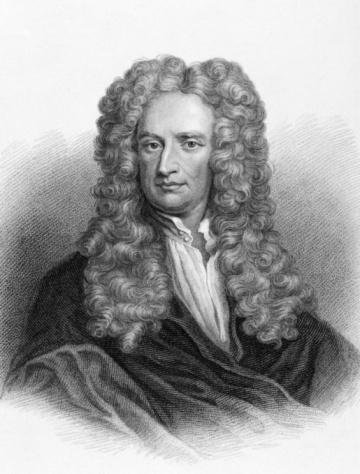A possible discussion on street corners, at bar tables, or perhaps at a coffee break in a university department, it would be about who the greatest physicist in history was. When we understand that all contributions are a product of the context in which they arise and are important in their own fields of interest to the advancement of science as a whole, it is clear that such discussions do not lead to great results. However, the subject remains interesting.
And the best candidate for this post English physicist and mathematician Isaac Newton. To try to understand why Newton contributed so much and so significantly to Physics and to Science as a whole, we can look at various aspects of his personal history.
Who was Isaac Newton?
Isaac Newton lived in the 17th century and had a privileged but lonely childhood. Newton’s family was wealthy, but his father died before he was born, and when he was only three years old, his mother left him with his grandmother to marry his stepfather, who was rejected by Newton. This rejection brought with it a loneliness that caused him to seek solace in books from an early age.
Newton attended Cambridge faculty and had to be isolated at home due to the bubonic plague epidemic that occurred in England in the 1660s, which meant he had time to develop his most relevant works. For example, exploring the spectrum of sunlight through a prism and describing the laws of motion. And even during this period, perhaps one of Isaac Newton’s most important contributions was the mathematical revolution brought about by the invention of Calculus.
This mathematical tool allowed for a great change in the understanding and description of natural phenomena with precision unprecedented for that time. During his lifetime, Newton’s invention was discussed by the German mathematician and philosopher Gottfried Leibniz, who also claimed to have invented calculus. The disagreement between the two scientists only came to an end when they both died. Both are now considered to have independently arrived at the invention of calculus.
In addition to all this, Newton is famous for explaining why masses attract each other (Law of Universal Attraction) after observing an apple falling from a tree. The apple portion is considered a myth by many. However, there are records of many who lived with Newton who claimed to have told this story themselves, except for the famous part that includes the fact that he was hit in the head by an apple.
Newton died at the age of 84 and is buried in Westminster Abbey. His laws of motion, gravity, and his invention of calculus still have a tremendous impact on physics and engineering today. His tombstone reads: “Here is Isaac Newton’s mortal.”
In fact, Newton’s ideas are immortal. However, whenever we highlight a great scientist, it is worth considering that Science cannot and cannot rely solely on discoveries and brilliant ideas. When we examine his background, it is possible to understand that Newton’s entire productivity, as well as his genius, was a result of the context of his life.
Newton himself is known for his saying, “If I have seen further, it is because I have stood on the shoulders of giants.” Today, thanks to Newton and others, we can see more. It is always important to remember that science is a job done by people like us.
Source: Tec Mundo
I’m Blaine Morgan, an experienced journalist and writer with over 8 years of experience in the tech industry. My expertise lies in writing about technology news and trends, covering everything from cutting-edge gadgets to emerging software developments. I’ve written for several leading publications including Gadget Onus where I am an author.












